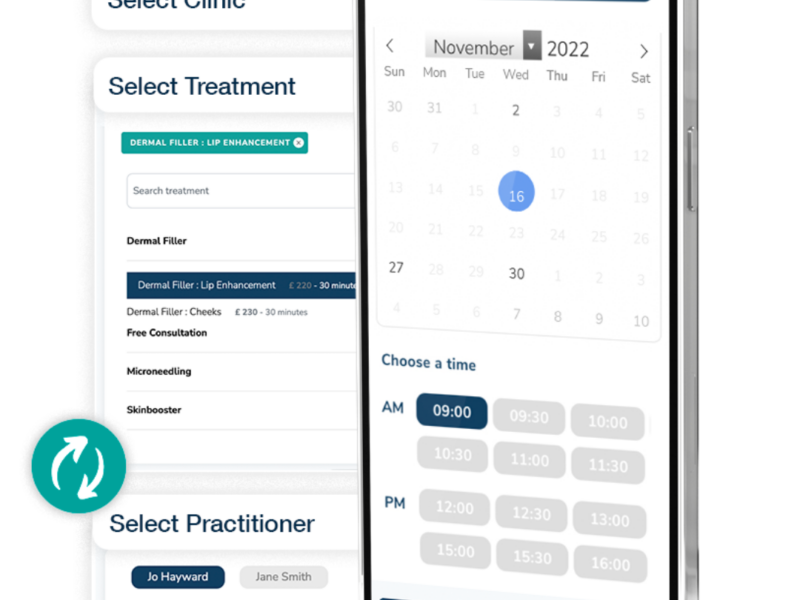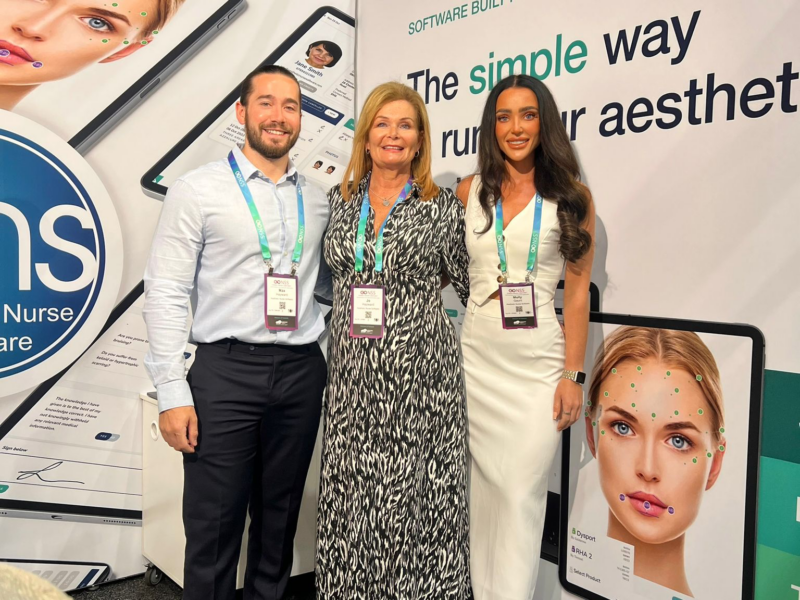
Is my business too small to need software?
January 26, 2022
Five ways software can free up your time to see more patients?
February 23, 2022What consent do I need for aesthetic treatments?
In the world of medical aesthetics, getting the right consent is a crucial part of your service. It not only protects your patients’ best interest but also your business in the event of any complications or claims against you.

Emma Carter • Feb 13, 2022
With a variety of different consent forms required within your aesthetics business, this blog explores the key types of consent you need to cover and why they are important for your aesthetics business.
#1 Treatment Consent for aesthetic procedures
Treatment consent is essential for patient care. To be considered as valid, it must be voluntary, informed, and the patient must have the capacity to make their own decisions.
If you are the practitioner conducting the treatment, it is your responsibility to thoroughly discuss with your patient and seek their consent before the treatment is carried out – this task must not be delegated.
The JCCP state:
Clear, accurate information about the risks of any proposed treatment, presented in a way patients can understand, can help them make informed decisions. The amount of information about risk that you should share with patients will depend on the individual patient and what they want or need to know. Your discussions with patients should focus on their individual situation and the risk to them. (JCCP, Code of practice)
Your treatment consent process should ensure patients have a strong understanding and realistic expectation of the potential results from their treatment, as well as any associated risks.
Treatment consent should inform patients about:
- Any potential adverse reactions, side effects and complications
- Alternative treatment options (including no treatment)
- Any pain or discomfort they may experience
- How long treatment results could last
- Any aftercare instruction that are involved.
You should think of consent as a two-stage process: a discussion about the procedure with its associated risks and benefits, and a record of that discussion.
Consent records might include a consent form signed by the patient. But your records should also include your own note of the specific consent discussion you had with the patient. (Journal of Aesthetic Nursing)Aesthetic Nurse Software provides easy-to-use consent forms that can be signed and stored securely. As well as spaces to write notes which are compliant with insurance requirements.
#2 GDPR Consent for patient data
The General Data Protection Regulation (GDPR) how you handle and store patient data. As a medical aesthetics practitioner, it’s crucial to obtain GDPR consent from your patients for 2 purposes:
1) Storing patient data
Under GDPR regulations, patients must consent to their personal information being stored. It is then your responsibility to ensure this data is held securely. As part of your consent process, you should obtain explicit consent from your patient (e.g. for example, “I agree to you holding my health data for the purposes of treatment”)
2) Marketing communications
If you want to send emails or texts to your patients for marketing purposes, you should give them the opportunity to give explicit consent by opting-in to receive such communications. For aesthetic clinics, this is commonly achieved at the point of booking, with a simple statement (e.g. Tick here if you would like to receive marketing emails and texts from us about our services) along with a tick box.
(Find best practice outlined by the Information Commisioner’s Office)
This consent must be knowingly and freely given (so don’t use pre-ticked boxes or any other method of default consent), as well as clear and specific about how and why you intend to contact them. (ICO.org.uk)
Clear records must be kept of what the patient has consented to. This can be crucial in the event of any complaint being filed against your clinic.
If you do fail to comply with the GDPR requirements then the penalties for breaching these regulations can be severe, the maximum fine is either 4% of your total annual worldwide turnover or £17.5 million, whichever is higher.
Utilising a cloud-based software like Aesthetic Nurse Software ensures your patient’s personal data is secure and accessible. It also gives you the tools to obtain and record the appropriate consent to meet your GDPR obligations.
#3 Photo consent for sharing patient images
Taking patient photos is an important part of any aesthetic treatment, primarily to form part of their medical record. “Consent to having these photos taken and stored should form part of the patient’s treatment consent, these images are considered necessary for treatment to be conducted.” (Harley Academy)
However, if you intend to share your patients Before and After photos publicly such as on social media, your website, or clinic leaflets, then you must obtain explicit consent from your patient to use those photographs.
To obtain explicit consent, it is recommended:
- To have the patient sign a consent form which clearly documents how and where you intend to share the patients photographs.
- Keep this consent separate to your treatment consent form.
- The patient should give their consent freely, with the understanding that they can say no.
- Clearly document the patients consent with date and time that it was obtained.
It is crucial for aesthetic practitioners to understand that if you do not have the patient’s consent to use their photograph for that purpose, you are potentially breaching data protection laws. (Enhance Insurance)
It’s also important to make it simple for patients to withdraw their photo consent at any time. Aesthetic Nurse Software allows patients to easily withdraw their consent with the click of a button, automatically documenting the date and time the consent was withdrawn. This leaves aesthetic practitioners with a clear audit trail of the patient’s photo consent journey showing the period of time where the patient was happy for photos to be used.
In Summary:
Consent is a crucial part of your aesthetics business. Patients should feel confident and comfortable that their personal data is stored securely and will only be used for the purposes they’ve consented to, and that they have been given all of the information necessary to make an informed decision. With consent not only protecting your patients interests but also your professional (NMC, GMC, GDC) responsibilities, this is not an area of your business to be overlooked.
Further Reading
What consent do I need for aesthetic treatments?
In the world of medical aesthetics, getting the right consent is a crucial part of your service. It not only protects your patients’ best interest but also your business in the event of any complications or claims against you.

Emma Carter • Feb 13, 2022
With a variety of different consent forms required within your aesthetics business, this blog explores the key types of consent you need to cover and why they are important for your aesthetics business.
#1 Treatment Consent for aesthetic procedures
Treatment consent is essential for patient care. To be considered as valid, it must be voluntary, informed, and the patient must have the capacity to make their own decisions.
If you are the practitioner conducting the treatment, it is your responsibility to thoroughly discuss with your patient and seek their consent before the treatment is carried out – this task must not be delegated.
The JCCP state:
Clear, accurate information about the risks of any proposed treatment, presented in a way patients can understand, can help them make informed decisions. The amount of information about risk that you should share with patients will depend on the individual patient and what they want or need to know. Your discussions with patients should focus on their individual situation and the risk to them. (JCCP, Code of practice)
Your treatment consent process should ensure patients have a strong understanding and realistic expectation of the potential results from their treatment, as well as any associated risks.
Treatment consent should inform patients about:
- Any potential adverse reactions, side effects and complications
- Alternative treatment options (including no treatment)
- Any pain or discomfort they may experience
- How long treatment results could last
- Any aftercare instruction that are involved.
You should think of consent as a two-stage process: a discussion about the procedure with its associated risks and benefits, and a record of that discussion.
Consent records might include a consent form signed by the patient. But your records should also include your own note of the specific consent discussion you had with the patient. (Journal of Aesthetic Nursing)Aesthetic Nurse Software provides easy-to-use consent forms that can be signed and stored securely. As well as spaces to write notes which are compliant with insurance requirements.
#2 GDPR Consent for patient data
The General Data Protection Regulation (GDPR) how you handle and store patient data. As a medical aesthetics practitioner, it’s crucial to obtain GDPR consent from your patients for 2 purposes:
1) Storing patient data
Under GDPR regulations, patients must consent to their personal information being stored. It is then your responsibility to ensure this data is held securely. As part of your consent process, you should obtain explicit consent from your patient (e.g. for example, “I agree to you holding my health data for the purposes of treatment”)
2) Marketing communications
If you want to send emails or texts to your patients for marketing purposes, you should give them the opportunity to give explicit consent by opting-in to receive such communications. For aesthetic clinics, this is commonly achieved at the point of booking, with a simple statement (e.g. Tick here if you would like to receive marketing emails and texts from us about our services) along with a tick box.
(Find best practice outlined by the Information Commisioner’s Office)
This consent must be knowingly and freely given (so don’t use pre-ticked boxes or any other method of default consent), as well as clear and specific about how and why you intend to contact them. (ICO.org.uk)
Clear records must be kept of what the patient has consented to. This can be crucial in the event of any complaint being filed against your clinic.
If you do fail to comply with the GDPR requirements then the penalties for breaching these regulations can be severe, the maximum fine is either 4% of your total annual worldwide turnover or £17.5 million, whichever is higher.
Utilising a cloud-based software like Aesthetic Nurse Software ensures your patient’s personal data is secure and accessible. It also gives you the tools to obtain and record the appropriate consent to meet your GDPR obligations.
#3 Photo consent for sharing patient images
Taking patient photos is an important part of any aesthetic treatment, primarily to form part of their medical record. “Consent to having these photos taken and stored should form part of the patient’s treatment consent, these images are considered necessary for treatment to be conducted.” (Harley Academy)
However, if you intend to share your patients Before and After photos publicly such as on social media, your website, or clinic leaflets, then you must obtain explicit consent from your patient to use those photographs.
To obtain explicit consent, it is recommended:
- To have the patient sign a consent form which clearly documents how and where you intend to share the patients photographs.
- Keep this consent separate to your treatment consent form.
- The patient should give their consent freely, with the understanding that they can say no.
- Clearly document the patients consent with date and time that it was obtained.
It is crucial for aesthetic practitioners to understand that if you do not have the patient’s consent to use their photograph for that purpose, you are potentially breaching data protection laws. (Enhance Insurance)
It’s also important to make it simple for patients to withdraw their photo consent at any time. Aesthetic Nurse Software allows patients to easily withdraw their consent with the click of a button, automatically documenting the date and time the consent was withdrawn. This leaves aesthetic practitioners with a clear audit trail of the patient’s photo consent journey showing the period of time where the patient was happy for photos to be used.
In Summary:
Consent is a crucial part of your aesthetics business. Patients should feel confident and comfortable that their personal data is stored securely and will only be used for the purposes they’ve consented to, and that they have been given all of the information necessary to make an informed decision. With consent not only protecting your patients interests but also your professional (NMC, GMC, GDC) responsibilities, this is not an area of your business to be overlooked.













